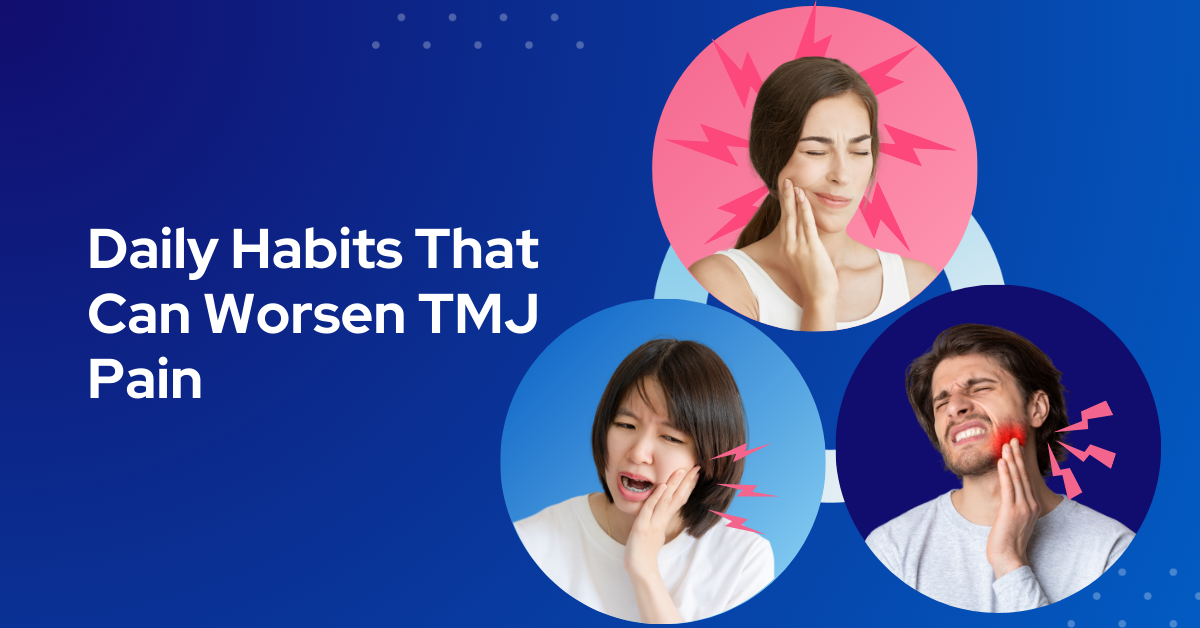Daily Habits That Can Worsen TMJ Pain
Temporomandibular joint (TMJ) disorders can cause significant discomfort, including jaw pain, headaches, and difficulty chewing. While TMJ pain can arise from various factors like injury or arthritis, and also can be from underdeveloped airways, some everyday habits can exacerbate the condition without you even realizing it. By understanding and avoiding these habits, you can better manage TMJ pain and improve your quality of life.
What Is TMJ Pain?
The temporomandibular joint connects your jawbone to your skull and acts as a hinge, allowing you to chew, talk, and yawn. TMJ disorders occur when this joint or the surrounding muscles become inflamed or damaged, or were never properly developed leading to:
- Jaw pain or tenderness
- Clicking or popping sounds when moving the jaw
- Limited range of jaw movement
- Earaches or headaches
Habits That Can Make TMJ Pain Worse
1. Teeth Grinding (Bruxism)
How It Worsens TMJ Pain:
Grinding your teeth puts excessive pressure on the jaw joint and surrounding muscles, leading to inflammation and discomfort. Bruxism often occurs during sleep, making it harder to control.
What to Do:
- Try a Spot Pal to minimize teeth grinding by training your tongue to rest properly in your mouth and open your airways.
- Practice stress-reduction techniques to reduce clenching during the day.

2. Poor Posture
How It Worsens TMJ Pain:
Slouching, especially while using screens or sitting for long periods, can strain the neck and jaw. Poor posture misaligns the TMJ, increasing pain over time.
What to Do:
- Keep your head aligned with your spine when sitting.
- Use ergonomic tools like a supportive chair or a laptop stand.
Studies show that 74% of people with TMJ disorders report worsened symptoms due to poor posture【1】.

3. Chewing Gum or Hard Foods
How It Worsens TMJ Pain:
Chewing gum or hard foods like nuts and ice cubes overworks the jaw muscles, leading to tension and aggravating TMJ symptoms.
What to Do:
- Switch to softer foods when experiencing a flare-up.
- Avoid repetitive chewing activities like gum altogether.

4. Nail Biting or Pen Chewing
How It Worsens TMJ Pain:
Biting nails or chewing on pens strains the jaw and forces the TMJ into unnatural positions. Over time, this habit can lead to chronic pain.
What to Do:
- Keep your hands occupied with a stress ball.
- Apply bitter-tasting nail polish to break the habit.
Nail biters are 25% more likely to experience TMJ-related discomfort【2】.
5. Sleeping on Your Stomach
How It Worsens TMJ Pain:
Sleeping on your stomach often forces the jaw into a misaligned position, leading to stiffness and discomfort upon waking.
What to Do:
- Sleep on your back or side with proper neck support.
- Use a pillow that keeps your head aligned with your spine.
6. Excessive Caffeine Consumption
How It Worsens TMJ Pain:
Caffeine increases tension in muscles, potentially exacerbating jaw clenching and teeth grinding.
What to Do:
- Limit caffeine to one cup of coffee or tea per day.
- Replace caffeinated drinks with herbal teas that promote relaxation.
Reducing caffeine intake has been shown to decrease TMJ pain in 60% of cases【3】.
7. Stress and Jaw Clenching
How It Worsens TMJ Pain:
Stress is a common trigger for jaw clenching, which puts added strain on the TMJ. This habit often occurs unconsciously during stressful situations.
What to Do:
- Practice mindfulness or relaxation techniques like yoga.
- Use reminders (e.g., sticky notes) to check your jaw position throughout the day.
Tip: Keep your tongue resting lightly on the roof of your mouth, with your teeth slightly apart.
Spot Pal’s Role in Relieving TMJ Pain
Spot Pal is a tongue training device designed to improve tongue posture and reduce strain on the TMJ. It works by:
- Promoting proper alignment of the tongue and jaw.
- Reducing clenching and grinding habits.
- Supporting overall oral health.

Everyday habits can significantly impact TMJ pain, either worsening it or alleviating discomfort. By being mindful of your posture, diet, and stress levels, you can take control of your TMJ health. Tools like Spot Pal can further support proper jaw alignment and promote long-term relief.
Sources:
- Journal of Oral Rehabilitation
- American Dental Association
- International Journal of Stress Management

Share:
Common Misconceptions About Speech Disorders: Debunking Myths
How to Create a Sleep-Friendly Environment for Better Rest